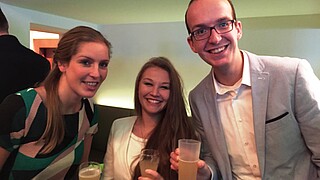Around 40 RSM students were asked to analyse Samsung’s current strategy and its corporate citizenship programme to identify risks and opportunities for improvement, and to create a new way of creating societal value for the company. Their reports and digital presentations were presented to Samsung, and in return the company’s senior managers presented conclusions back to the students.
Regular live business case
The group of international students followed the four-week Sustainability Leadership and Planetary Boundaries core course in teams of four or five as part of their specialised master programme at RSM. The course is led by RSM Assistant Professor Steve Kennedy, who explained that a live business case is a regular feature of the students’ first term; last year students worked with office solutions company Ricoh.
Michiel Dijkman, head of Public Affairs & Corporate Social Responsibility for Samsung Electronics in the Benelux countries said: “The creative ideas of the students are very valuable for Samsung’s CSR strategy in the Benelux. I am currently verifying their ideas for 2016.”
Real company pitches
Students learned to put theory into practice, experiencing aspects of sustainability from a corporate perspective and using their analytical skills and creativity. Pitching to a real company exercises their presentation skills, with the excitement of working on a live business case and the prospect of creating a winning idea that might be used by the company itself.
“It was interesting to see and hear common threads in the students’ stories, and I enjoyed giving the guest lecture to these active and assertive students. Hopefully, they learned about the daily business of a CSR manager – and I also learned something from their critical, and sometimes idealistic, questions and comments,” added Michiel Dijkman.
“Working on a live business case really motivates and sharpens their focus. Knowing you will have to pitch your idea to the company and that it might be implemented it into strategy is an exciting prospect,” said RSM’s Dr Steve Kennedy.
Real world
“Business challenges such as these help bring sustainability out of the classroom and into the real world. Students need to imagine themselves in the company’s shoes, first working out its material sustainability issues and how to leverage its competencies, and then innovating to create societal value. For many students this is the first pitch to a real company, which is a great experience,” added Dr Kennedy.
The winning team produced a ‘SmartConect’ plan that allows young people and the elderly to learn together using new technology. Students in the team were Guido Moroni, Merel Leeuw, Merel Wallis de Vries, Nicolette Tan and Sean Filidis.
Dr Steve Kennedy said: “They aptly leveraged Samsung’s strategy, and created new synergies between two previously unconnected stakeholder groups – the elderly and young people. Their SmartConnect idea was creative and showed clear benefits to all parties, while keeping a high level of feasibility.”
Samsung holds social contribution as one of the most important aspects of sustainability issues most pertinent to its business and stakeholders. The company runs a corporate citizenship programme that includes education activities, such as the innovation and digitalization of the education system in www.smarteducationhub.nl to close the digital skills gap, as well as a project for digital inclusion of seniors, for whom smart living is becoming more important for healthcare and staying independent.
Students were asked to take all of this into consideration when they designed their project to enable Samsung to communicate with its target audience, and a broader audience, co-operate with government and other stakeholders, and involve employees in the next steps of the company’s corporate citizenship programme.
For more information about ways that companies can team up with RSM for research, recruitment, internships and learning, see Information for companies.







